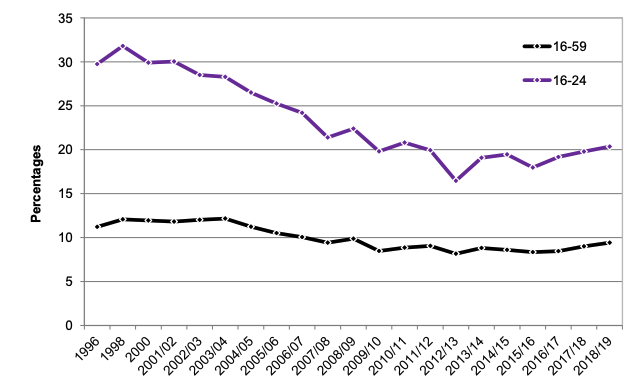Curiosity, peer pressure, depression, and being under the influence of alcohol or other drugs are common reasons why people do coke for the first time. The reasons why they keep going back to it? Well, that varies, and we’ll explore that more in this article.
Rehab Costs & Options
Statistics About Cocaine Use in the UK
Cocaine use in the UK has been on the rise in recent years, according to HomeOffice.gov.uk, which annually surveys a sample of adults ages 16 to 59 to:
- Estimate the frequency and amount of drugs used by adults
- Learn about characteristics including lifestyle and household factors that may influence drug use
- Measure new psychoactive substances (NPS)
- Gauge how easy illegal drugs are to obtain
The Home Office annual survey includes many illicit drugs in addition to cocaine, including amphetamines, cannabis, cocaine powder and crack, ecstasy, heroin, ketamine, LSD, magic mushrooms, methamphetamine, tranquillisers, and other drugs. They publish their findings annually in Drugs Misuse: CSEW (Crime Survey for England and Wales) statistical bulletin.
In the 2018/19 publication, you can see that cocaine use has been on the rise since 2012, especially among adults ages 16 to 24.

When comparing cocaine use to other Class A drugs (ecstasy, hallucinogens, and opiates), it is the most popular Class A drug among all surveyed adults aged 16 to 24:
- 6.2% reported using cocaine in any form
- 4.7% reported using ecstasy
- 2.3% reported using hallucinogens (LSD and magic mushrooms)
Only cannabis (a Class B drug) had more reported users, with 7.6% of adults ages 16 to 59 and 17.3% of adults aged 16 to 24 reporting to have used it in the previous year. Another survey, conducted by Addaction Scotland and reported by Sky News, found that cocaine is the second-most popular drug among regular drug users (second to cannabis). Among those surveyed, 78% said they regularly use cannabis and 70% said they regularly use cocaine or crack cocaine.
Why do so many people use cocaine, especially with so much widespread information about its addictiveness and dangers? We’ll explore that next.
Why Is Cocaine Popular?
Cocaine is popular for many reasons: It is socially accepted. In recent years, its quality has improved. It is easy to get. And, most of all, it produces a dangerous high that is hard not to like.

Cocaine — The ‘Glamour’ Drug
Cocaine has long been seen as a recreational weekend party drug for the rich and rich. In the 1970s, it was the “glamour” drug of the disco scene, high-profile celebrities, and rock stars. Cocaine has been depicted through popular culture in movies like “Scarface,” “Dazed and Confused,” and “Pulp Fiction” in ways that associate the drug with the tragically hip.

Cocaine — The ‘Safer’ Drug?
The purity of cocaine is at a record high, according to The Independent, which gathered research from several sources, including forensic research from King’s College. Scientists there studied London’s wastewater and found cocaine levels have been steadily rising and the purity of coke is at an all-time high. The quality — or purity — of cocaine could explain its resurgence as a popular recreational drug.

Cocaine — The ‘Available’ Drug
Buying drugs is as easy as buying ice cream in the UK, according to a 2019 article, which includes an anecdote about one woman who bought cocaine from her local ice cream vendor.
Why are cocaine and other drugs so easy to get? Mobile phone technology, social media, and “the dark web” have made all illicit drugs easier to obtain. Think of the dark web as a series of unmarked doors in a building that you can find only by being part of a secret community. One user described to MyLondon how it took her only 30 minutes to find a drug dealer on the dark web.

Cocaine — The ‘Happy’ Drug
Research studies suggest that Cocaine has a dangerously powerful effect that leaves users feeling intense pleasure, confidence, happiness, and euphoria. Those powerful feelings produce intense pleasure and stimulate the human brain the same way things like success, love, and real accomplishments do. We’ll explore cocaine’s addictive traits next.
Why Is Cocaine So Addictive?
Among the lists of most addictive substances, cocaine is always among the most addictive substances in the world:
- Alcohol
- Cocaine
- Barbiturates
- Heroin
- Methamphetamine
- Nicotine
Cocaine is addictive because it stimulates pleasure centres in our brains and our brains adapt to it, building up a tolerance, requiring more and more to produce the same euphoric effects. It is the second-most psychologically dependent drug (after methamphetamine), according to DrugFreeWorld.org.
To understand why it is so addictive, it’s helpful to understand the short- and long-term psychological and physical effects that happen when people use cocaine.
What Happens When You Do Coke?
Common short-term psychological effects of cocaine include:
- Extreme happiness, elation
- Mental alertness
- Hypersensitivity to sight, touch, sounds
- Irritability
- Paranoia
- Talkativeness
When cocaine is smoked (in “crack” form), the effects can be stronger and quicker, but they don’t last as long. When cocaine is in its powder form and snorted, the high can last 15 to 30 minutes or longer.

Common short-term physical effects of cocaine include:
- Dilated pupils
- Fast or irregular heartbeat
- Restlessness, shakiness, muscle twitches
- Nausea
- Constricted blood vessels
Common long-term health effects of cocaine use:
- Nosebleeds, loss of smell, sinus problems, and problems with swallowing, especially for people who snort cocaine
- Respiratory conditions, including coughing, breathing problems, asthma, and pneumonia, especially for people who smoke cocaine
- Hepatitis C, HIV, and other blood-borne illnesses, especially for people who inject cocaine
Additionally, the withdrawal effects, especially depression, and fatigue, from cocaine use can lead to addiction. As the high wears off, people use cocaine to counteract the symptoms. Cocaine use becomes a dangerous, vicious, and addictive cycle that is hard to stop. Fortunately, there are excellent programs that help people overcome their addiction to cocaine.
Are You Already Addicted to Cocaine?
You don’t have to overdose on cocaine (or any drug) to need help. Many cocaine addicts lead functional lives, all the while battling the demon that is drug addiction.
How do you know if you’re addicted to cocaine? You may experience some of the common withdrawal symptoms, such as anxiety, depression and aggression, paranoia, and strong cravings for the drug. Other signs include changes in behaviour, eating habits, and self-care and hygiene. Addicts tend to lose interest in things they enjoy, such as hobbies and spending time with friends and loved ones. As addiction grows, cocaine addicts may experience financial difficulties and find themselves in legal trouble.
No matter where you are in your addiction or recovery, our website has information on cocaine addiction, cocaine detox and cocaine rehab treatment. Continue reading through our addiction therapy resources.




